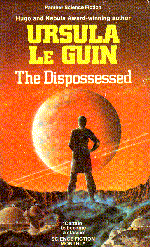|
The Dispossessed
Copyright 1974 by
I first read this in December 1975 and most recently on the 2nd September 2002 Thousands of years in our future, civilisation survives on the eight Known Worlds. while Earth itself is a barely-populated ruin. The moon Anarres circles the planet Urrass. One hundred and fifty years ago anarchist rebels left Urrass to set up a colony on Anarres. It's been a very tough existence, especially with the inefficiencies of anarchic cooperation. However, a tough and morally strong population has developed where individuals have no personal property, but where society really does care for the individual. Their only enemies are the arid and drought-prone climate and their near-instinctive fear and loathing of the societies of their original home world, Urrass. This fear of strangers extends to all outsiders, including those of Earth and the Hanish aliens, and neither of these peoples are allowed to land on Anarres. Shivak is a scientist, a theoretical physicist. All he wants to do with his life is ponder the space-time continuum and strive to create a Unified Field Theory. His work, if successful, could lead to FTL and to instantaneous communication across the galaxy. However his work is unpopular on Anarres. Anarres has no interest in space exploration nor in communication with the other human worlds. Shavek is a fervent believer in his world's brand of staunch anarchism. However, when he's invited to Urrass to continue his work, he accepts and leaves his homeworld. On Urrass, he is overwhelmed with the splendour of its luxuriant ecology and with the apparent success of its capitalist politics (which fly in the face of everything he knows). We follow the story of Shevek in two interwoven threads - the first his current life and experiences on the planet Urrass, and the second his life as a younger man back on his homeworld Anarres. Being a perceptive guy, I knew this was a good book when I first read it so long ago. It still stands up as an SF classic. However, I had two problems with it. Firstly, I thought it was a little slow. Nowadays I still think it's a little slow, but it doesn't matter so much - the book has a lot to say and is (of course) deeper than I originally realised. Secondly, the ending is a little weak. I wanted interplanetary war, faster-than-light starships flashing through hyperspace, etc. The actual ending is a little more gentle than this, and by darn, probably more appropriate. If you've ever had the sneaking suspicion that all forms of government are oppressive, undesirable and should be abolished, then read this book to get a feel for how an syndicalist-anarchist society might feel and function. I was pretty much all for this anarchism, and the casual sex, except for the hard work. There's some lovely writing of course, and then there's this.
No fun. Never, All day long we dig lead in the bowels of the mines, and when night comes, after our meal of three holum beans in brackish water, we antiphonally recite the sayings of Odo, until it is time to go to bed.Pah. Beans! They had beans. We just had brackish water. We'd have killed for beans. Loaded on the 24th September 2002.
|
|






